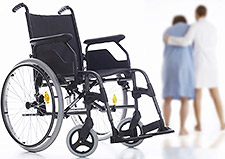|
Options for respite care: In-home or Outside-of-home
Respite care in the family home
This can be formal, such as personal care services or home health services through various types of in-home care programs under the Department of Human Services for a family member while you take a vacation; It can also be informal, such as simply having a neighbor come over while you go shopping.
Advantages of in-home care:
Disadvantages of care in the home:
Respite care outside the home

Options for care outside the home can include:
Some of these respite options may be available in your community. Contact your local Lifespan Respite Program Coordinator.
Respite in the provider’s home: some examples
It’s often located in schools, churches, and community centers. Respite can be offered after school, during the daytime or on Saturdays for children and for adults with developmental disabilities and other special needs. There are also day programs for seniors that offer respite to spouses and other primary family caregivers. Additional special times can also be available during holidays or summer breaks. Programs usually require planned scheduling, but may also have “drop in” times.
Potential advantages:
Potential disadvantages::
Some fun and interesting activities can be offered through city parks and recreation programs, Church programs, or other community programs such as:
A respite care program may be able to help you use these community activities by:
Summer or holiday camp (Overnight or day camps) There are many kinds of camps, including some specialized camps for children with special needs. Camps do offer many of the benefits as those through respite centers and community activities, such as: structured activities, trained staff, and a predictable length of time for respite. Check with your local Lifespan Respite program coordinator for possible assistance with payments. You can also check with your local Campfire, United Way, school districts, Education Service Districts and other agencies for information on camps and “campership” or other financial assistance.
These programs provide a safe and fun place for children while caregivers get a needed break. A typical parents night out program:
To find out about local parents nights out, contact your local Lifespan Respite program coordinator.
Sometimes, local hotels donate rooms or facilities for a weekend to parents or primary caregivers, while respite providers care for the child or adult with special needs. To find out about local “respitality” opportunities, contact your local Lifespan Respite program coordinator.
Family co-ops, exchanges or barter systems Respite can be occasional informal care or structured formal cooperative systems. It usually involves no cost or exchange of money, but a trade of hours by members of co-op families. Within the co-ops, families can have organized training for co-op members on CPR/First Aid, behavior management and other issues. Contact your local Lifespan Respite program coordinator for assistance with possible operation of respite co-ops.
It can be an informal arrangement with neighbors or friends for someone of a similar age and with a similar interest to share an activity together in the community. This can be a trip to the mall, seeing a movie, or just playing or hanging out together. It can also be a formal arrangement through programs such as Big Brother/Big Sister, “Special Friends” or “Fostering Friendships”. To find out about local companionship programs, contact your local Lifespan Respite program coordinator.
Respite care in a residential facility Often available in group homes, residential programs, nursing facilities, hospitals and other programs.Benefits include:
Potential drawbacks:
Crisis or emergency respite care Important resource in case of:
Contact your local community mental health program or United Way for information on emergency respite services, investigate programs beforehand, and keep their number handy. Also contact your local Lifespan Respite program coordinator for for further information and referral.
|
|

